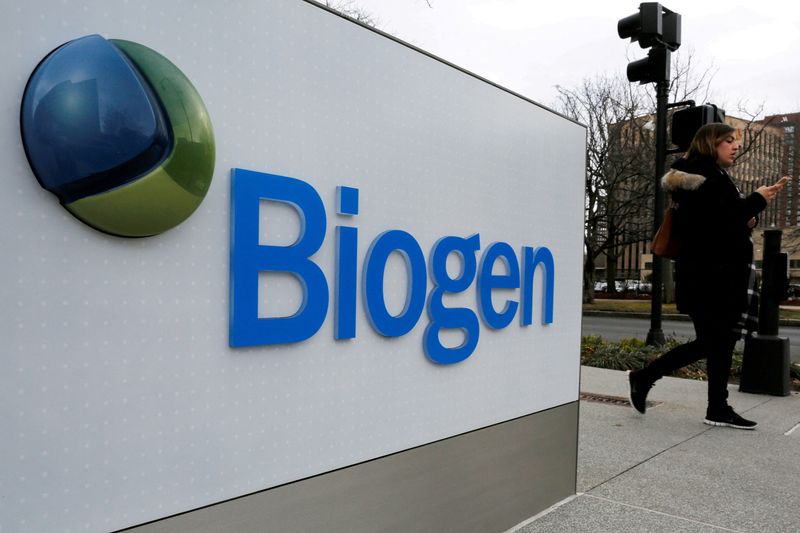By Manas Mishra and Mariam Sunny
(Reuters) -Biogen Inc said on Tuesday it expects to slash about 1,000 jobs, or 11% of its workforce, in a fresh round of cost-cutting as it looks to the launch of a new Alzheimer's drug to help it return to growth.
The company said its costs are elevated compared to rivals and that it would focus on higher-growth products such as the recently approved Alzheimer's drug Leqembi, which it sells with partner Eisai.
"We had very prosperous times in the more recent history of the company. And we have seen a reversal of fortunes in some of those products," said CEO Christopher Viehbacher.
That reversal is highlighted by slumping sales of the U.S. drugmaker's multiple sclerosis treatment Tecfidera in the face of cheaper generic rivals, while the future of its spinal muscular atrophy drug Spinraza looks less certain due to intense competition from rivals sold by Novartis and Roche.
"I don't think we as a company have really made the changes in our ... cost base to really reflect that transition," Viehbacher said after the job cuts were announced.
Biogen (NASDAQ:BIIB) shares were off 4% at $265.92.
A former Sanofi (NASDAQ:SNY) CEO, Viehbacher was hired in November to put the biotech back on a growth path and help it recover from a series of missteps around the controversial Alzheimer's drug Aduhelm that never gained traction.
"CEO Viehbacher is in a tough position, as it's near impossible to cut to growth, but we appreciate the need to critically look at all current operations as Biogen evolves," said BMO Capital Markets analyst Evan Seigerman.
Biogen, which had 8,725 employees worldwide at the end of 2022, expects to re-invest about $300 million of the announced cost cuts into drug launches and research and development.
Excluding the re-investment, the program aims to reduce about $700 million in net operating expenses by 2025.
Biogen said it would now focus on the launch of Leqembi.
The U.S. Food and Drug Administration earlier this month granted standard approval to Leqembi, clearing the way for wider insurance coverage, but also flagging the risk of potentially dangerous brain swelling, a known risk for Alzheimer's drugs in the same class.
"There's an awful lot of education around safety to make sure that the right patients are in place," Viehbacher said, adding that talks with commercial insurers on coverage for Leqembi were going well.
Some sites that will be administering Leqembi are ready to go, while others have been in a wait-and-see mode, the CEO said.
"It all depends on really how advanced the sites are, how ready they are, that is really going to define the uptake."
Eisai and Biogen are also working on an injectable version of Leqembi, which could take the drug out of specialized infusion centers and possibly allow for future home administration.
Regulatory filings for that version of the drug are expected to be completed by the end of the first quarter of 2024, Biogen said.
Biogen also said it would look at deals across rare diseases, immunology and neuropsychiatry, but that upcoming drug launches should help the company return to growth over the next three years without the need for deals.

Viehbacher said the company's current pipeline will allow Biogen "to be picky" about deals.
"We have a nice cash balance of $7.3 billion at the end of the year," he said.